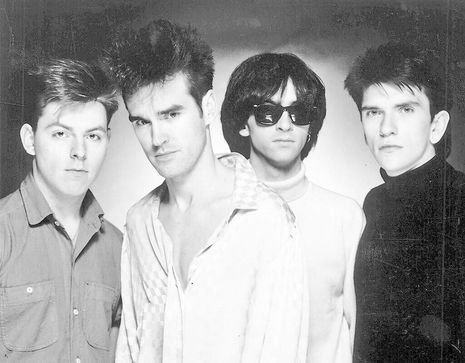The Smiths and beyond: a tribute to Andy Rourke
David Quinn reflects on the musical legacy of the Smiths’ legendary bassist

Similar stories have been shared across the Internet since the death of Andy Rourke, the bass player for The Smiths. Someone, somewhere, places the needle down on the Smiths. Picking up their bass guitar, they try to emulate the treble-heavy tones of ‘Barbarism Begins at Home’, or lock into the groove of ‘The Headmaster Ritual’. Whichever song you pick, the bassline is fundamental.
“The Smiths needed Rourke just as much as Morrissey and Marr”
I will never forget fumbling along to ‘Bigmouth Strikes Again’, desperate to hit every impossible note that Rourke plays. I first fell for the Smiths’ lyricism, Morrissey’s existential whine and wit, but it was the bass that kept me coming back. Without Rourke, there would be no rhythm for Marr’s guitar to soar over in ‘How Soon is Now?’, nothing behind Morrissey’s croon in ‘I Know It’s Over.’ In other words, the Smiths needed Rourke just as much as Morrissey and Marr.
Listening to the fast scales of ‘This Charming Man’, it is easy to forget that Rourke wasn’t even 20 when it was released in 1983 (thoroughly putting every Cambridge undergraduate to shame). After meeting Andy at school, guitarist Johnny Marr persuaded him to pursue the bass – a decision which would lead to his recruitment into the newly-formed the Smiths in 1982. When the band split in 1987, he was just 23. All his basslines, every intricate detail, were composed in just this short space of time while he was still so young. That alone could be Rourke’s legacy.
Suede's bass player Mat Osman paid tribute to Andy Rourke Twitter (@matosman)Aw man. RIP Andy Rourke. A total one-off - a rare bassist whose sound you could recognise straight away. I remember so clearly playing that Barbarism break over and over, trying to learn the riff, and marvelling at this steely funk driving the track along. (pic - K Cummins) pic.twitter.com/c3iBdsstpC
- Mat Osman (@matosman) May 19, 2023
Not that Rourke gave up after the breakup of the Smiths. His distinct style can be found on releases from artists as varied as Sinéad O’Connor and the Pretenders. He even appears on some of Morrissey’s early (and better) solo material. ‘The Last of the Famous International Playboys’ is just as irresistible as anything Rourke performed with the Smiths. Rourke was also a keen supporter of cancer research, organising benefit concerts under the banner of “Manchester v Cancer”. At the first concert, Marr and Rourke reunited, burying any bitterness left from the Smiths.
“As long as there are outsiders, the Smiths’ ability to mix loneliness with humour will retain its appeal.”
You cannot count how many lives Rourke’s basslines have influenced. The Manic Street Preachers, New Order, Billy Bragg and countless other artists immediately delivered their tributes to him as a musician and often as a friend. Suede’s bass player Mat Osman commented on Rourke’s “steely funk”: his ability to provide a melodic counterpoint to Marr’s intricate guitar work whilst also maintaining the groove.
But it is not just the musicians who matter. There are countless overly romantic and emotional students, with the Smiths’ posters covering their walls, who have found consolation in his music. As long as there are outsiders, the Smiths’ ability to mix loneliness with humour will retain its appeal. I will always return to their third studio album The Queen Is Dead when I am struggling to study and allow the music to cheer me up in its own melancholy way.
It can be frustrating to be a fan of the Smiths in light of Morrissey’s recent far-right fanaticism, but this should not diminish the alchemy that was the band’s music. In light of Rourke’s death, it is the Morrissey song ‘First of the Gang to Die’ which has taken on a new poignance for me. While not written about Rourke, it encapsulates the feeling of losing part of the group, of losing a friend. As he repeats the closing refrain, I find something that I can agree with Morrissey on: Rourke did steal “all hearts away”.
 News / Christ’s announces toned-down ‘soirée’ in place of May Ball3 February 2026
News / Christ’s announces toned-down ‘soirée’ in place of May Ball3 February 2026 News / Deborah Prentice overtaken as highest-paid Russell Group VC2 February 2026
News / Deborah Prentice overtaken as highest-paid Russell Group VC2 February 2026 Fashion / A guide to Cambridge’s second-hand scene2 February 2026
Fashion / A guide to Cambridge’s second-hand scene2 February 2026 News / SU votes unanimously to support community kitchen4 February 2026
News / SU votes unanimously to support community kitchen4 February 2026 Comment / College rivalry should not become college snobbery30 January 2026
Comment / College rivalry should not become college snobbery30 January 2026










